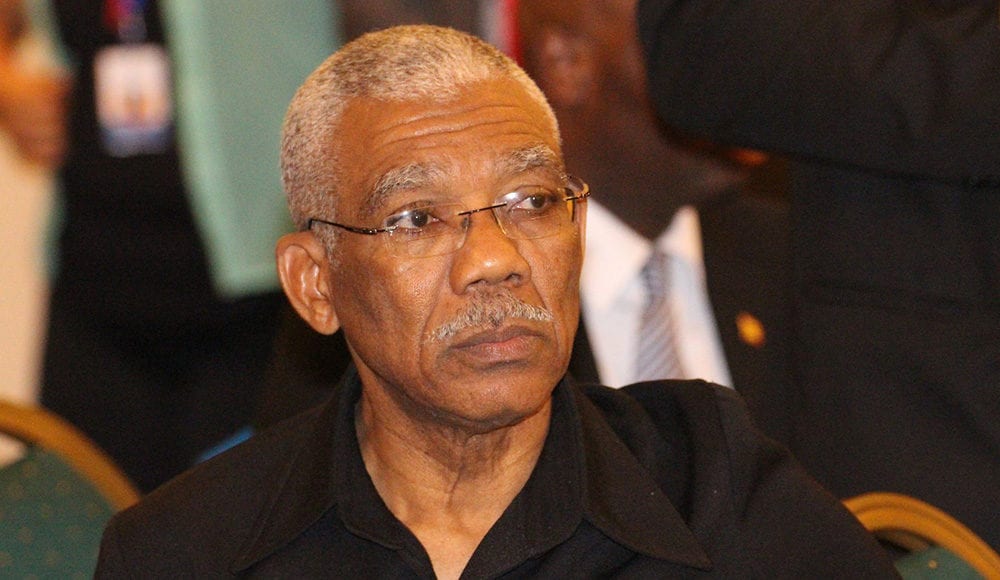Discussion in the South American country of Guyana on whether or not a portion of coming oil revenue should be transferred directly to households continues to take centre stage with the country’s president and finance minister, while not ruling it out, remaining cautious about the implementation of such a proposal.
President David Granger said on Wednesday no definitive position has yet been taken on the proposal but more information on how it can potentially be done is needed. “…there is no for or against. The proposal has been made by the Working People’s Alliance, but we have not worked out the details. The other partners are not against cash grants, but we asked for more information and details about who will be eligible and how it will be disbursed.”
He said it is imperative that a careful analysis is done to determine its feasibility, since it serves no purpose to make such pronouncements without substantiating evidence.
“We need to decide how the profits must be shared with other national needs. We don’t know how much we are getting so we are asking our partners to address their minds to how much needs to be spent for what purpose and for whom, he explained.
He also added that, “There has been a lot of speculation and we ask that people put figures to their intention before we make any public discussion but the APNU is not against cash grants. It needs to know more so it can make a proper announcement to the people of Guyana.”
Meanwhile, Minister of Finance, Winston Jordan on Wednesday reiterated his position on the proposal that would see large sums being transferred to citizens from oil proceeds. “At the end of the debate, we will come up with a certain construct on whether this can work and how it will become sustainable, but in the meantime, I am urging Guyanese to be patient.”
From an economic standpoint, Mr. Jordan said such a proposal has to be carefully thought-out, noting that the Government will not make rash decisions on such a sensitive issue.
“When this debate first started it started with Professor Clive Thomas and he had said 5000 US dollars to all households. No one knows where he gets the 5000 from and no one knows whether he had considered this thing properly. When the Math was quickly done it was realized that it didn’t even add up,” the finance minister indicated.
Direct cash transfers were first proposed by Professor Clive Thomas, executive member of the Working People’s Alliance’s (WPA), a smaller party in the APNU component of the coalition government.
“5000 US for 206000 plus households will carry you in the realm of numbers you weren’t going to see in a hurry”, Mr. Jordan pointed out, referring to the initial sums the country is set to receive – around US$300M annually – during the cost-recovery phase when oil production begins within months.
Professor Thomas, in his most recent comments on the matter, has said that it could indeed take several years before Guyana is in a position to make cash payouts. The timeline for its implementation, as proposed by Professor Thomas, is tied to a ramp-up in oil production of 1.5 million barrels per day or more, something that is not likely to occur in the South American country before the end of the next decade.





This cash payout suggestion is absolutely out of sync with Guyana’s current and long term profile given the non-current O&G depletion rate rules and a lack of any solid working frameworks inclusive of that which is needed for the much needed infrastructure development to support O&G and it’s spill over effects on other areas in the economy – to avoid the greater danger – the dutch disease!
So cash payout = Venezuela n the dutch disease..
Honestly, why would this be a productive idea right now? This must never occur at the unset of any country with same profile as Guyana’s. If instead of cash you would build out better shared public housing schemes and encourage spending on improving living standards for the citizens of Guyana – then Amen. Cash payout – dumb idea for a O&G startup like Guyana with such a poor economic profile..Only leading cowards would shun their responsibilities toward the nation in favor of putting the burden directly on the people’s shoulders..very bad idea indeed!
Instead of giving money away, Guyana needs to upgrade it’s fundamental infrastructure. By investing the money in infrastructure jobs will be created, workers will achieve new skills and the government will collect additional taxes.
Up-to-date and functioning infrastructure will benefit everyone with respect to health, education and well-being. This can generate a sense of community and pride such that the citizens of Guyana will want to live in Guyana and not migrate to somewhere else.
Another important benefit will be that local business can grow and prosper and become more competitive internationally. This can generate more export, thus earning additional foreign exchange and again more taxes collected.
Another thought just occurred to me is that payroll taxes can be almost eliminated, and business taxes too. This will provide incentive for people to work and accumulate wealth.
The following projects or upgrade are needed now:
Road Infrastructure
Sewer and Sewage
Electricity Infrastructure and Solar power
Education
Health Care
Tourism
Public transit
Internet and Wifi
Sincerely
Peter.R